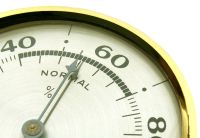For those who desire to fit into a new country, nothing can quickly undo their best efforts and betray their foreign origin quite like the weather. One could master the local language and customs of, say, Thailand or Japan, and still end up being the only one in a busy public area (e.g. a crowded train) who seems to be breaking a sweat once the tropical heat and humidity kick in, with the subsequent pheromonal odors making you stick out like a sore thumb.
New transplants to Singapore will have more than enough chances to encounter a situation like the above, although they may not have to worry about committing etiquette breaches as severe as those that might be associated with Japan (where the frowned-upon habit of touching your face may become a necessity in order to wipe steadily forming sweat droplets off of it.) Technically speaking, Singapore is classified as a tropical rainforest climate by the esteemed Köppen climate classification, which means that there is not only no ‘dry’ season to speak of, but there are no distinct seasons as you might encounter them in continental Europe or the North American ‘heartland’ (yet not unfamiliar to residents of Central Africa, much of South America, and other southeast Asian countries.)Singapore's location and its effect on climate
Singapore is conveniently positioned one latitudinal degree north of the equator, which means hot temperatures can be expected there more often than not: average temperatures in January alone are from 23.3°C at the low end to highs of 34.3°C. Though inhabitants of non-tropical climates might immediately flee at mention of this warm January, expecting brutally hot summer temperatures, the truth is somewhat different: both the average and record high temperatures for the region in July are little different than they are in January, shifting only one or two degrees in either direction.
For those who are used to temperatures reaching 40°C in the summertime, this does not seem all that bad, but again it is important to remember that the percentage of humidity in the air rarely dips below 82%, and the effect this has on overall comfort levels can be jarring: some expats joke that there are four seasons in Singapore: “hot, hotter, wet and wetter.”
Physical adjustment to this sensation of walking through viscous air may take anything from weeks to months, so those unfamiliar with tropical climates should make it a priority to secure housing where it is cool enough to allow good nights of sleep and to prevent severe irritability during business and social proceedings. Luckily, indoor air conditioning is widely available as a respite (the air conditioner servicing business also seems to be booming in Singapore, with dozens of distinct web sites devoted to this topic), and a few helpful blogs by Singapore natives have even been set up to advise “air-con” purchasers of the features and costs of the best available units.
Possible effects of heat and humidity on social life
Another recent article here at Expat Focus dealt more exclusively with social life in Singapore, and hinted at how that might be modulated by a hot and humid climate. In addition to that article’s warnings about the strict laws pertaining to public drunkenness in Singapore, this type of climate presents another challenge to the hearty drinker. Namely, the diuretic and dehydrating effects of alcohol are likely to be much more pronounced in uncomfortably warm and sticky weather, and it may be wise to supplement alcohol drinking sessions with water or fruit juice.
Lovers of heavy, greasy meals may also want to phase in other dietary options. The energy expended on digesting the saturated fats endemic to deep-fried and shortening-laden foods will, especially on humid afternoons, make for a pervasive feeling of sluggishness that can certainly outweigh the joys of chowing down on a fast food treat from local vendor Ramly Burgers (or the international chains that are as readily available in Singapore as anywhere in the industrialized world.)
Planning on outdoor gatherings with friends or coworkers is also something that should be done with Singapore’s heavy annual rainfall in mind: yearly precipitation can range from 2,100-2,200 mm, an amount that easily qualifies it for ‘top 10’ status among the nations of the world (neighboring Malaysia beats Singapore by a couple hundred millimeters per year.) One should probably not take on a role as the “fun coordinator” within their peer group if they aren’t prepared to deal with the eventuality of picnics, market meet-ups etc. getting rained out.
A warning about weather warnings
It’s worth noting that some locals have criticized the local government for not providing sufficient weather alerts during more extreme periods – for example, on hot days when the elderly may wish to avoid going outdoors to avoid the risk of heat stroke. With this in mind, it might be a good idea to keep an eye on information released by foreign weather services prior to going about one’s daily business in times of either peak rain or heat.

